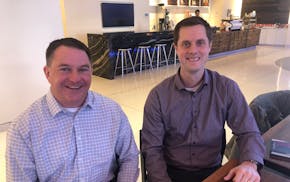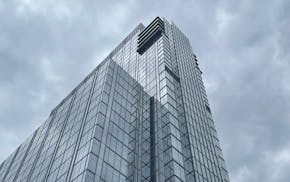Jerry Goodwald paused and bent over to pick up a smudged, barely recognizable quarter the other day at his small business, GEM-Ash in Rosemount.
"We collect up to $2,000 a month in change," he said, tossing the quarter in a bucket.
It's a phenomenon Goodwald knows well from years as an engineer and executive in the steel and metals industry. Ten years ago, as regional vice president for Gerdau Steel, Goodwald was responsible for a Texas steel-shredding operation that annually tore apart more than 14 million cars to recycle metal.
"We would remove about $1.25 per car on average wedged in the seats before we shredded them," he said. "That's real money."
Today, his six-year-old firm GEM-Ash mechanically recovers gold, copper, aluminum, steel and other precious metals from ash of the Hennepin County Energy Recovery Center, or HERC, after it is trucked to the SKB Environmental landfill in Rosemount.
"We extract up to 1.3 million pounds of metals a month," said Goodwald, 62. That's up to 8% of the total ash trucked from the garbage to energy center in downtown Minneapolis.
He left Gerdau in 2014 to join his sons and form GEM-Ash, which now has seven employees.
Hennepin County estimates that about 45% of the paper, metals, glass and other recyclable stuff is diverted for recycling by consumers and businesses before it gets to HERC. It burns 1,000 tons of garbage a day to generate electricity and steam for which it is paid a $63 per ton tipping fee, plus a few million by Xcel Energy.
The residual ash is hauled to the Rosemount landfill. SKB gets $33 per ton, less a $2 per ton credit to Hennepin County.
The incinerator shrinks the garbage by 75% and Goodwald tries to make a buck by shrinking the leftover ash.
GEM-Ash has grossed $2 million to $3.5 million annually in revenue since 2015. Dirty metals, coins, brass from furniture and fixtures, and steel and aluminum components can all survive the incineration at HERC. The business has proved a low-return venture so far, Goodwald said. GEM-Ash provides the cash for the $2 per ton credit to Hennepin County and pays SKB an unspecified amount on top of that.
GEM-Ash's revenue varies based on commodity prices, which have been low for the past two years in part because of the U.S.-China trade war.
"Last year was a struggle," Goodwald said. "Commodity and steel prices were down. China responded to the tariffs by not taking American metals, and prices plummeted, especially aluminum. And the auto industry went down.
"We curtailed our costs. In 2020, we've had one month so far where we didn't have positive cash flow. And September should be a good month. I'm optimistic about the future. I'm also a realist.''
The China trade resolution this year, although not living up to its billing so far, has helped commodity prices. And much depends on the U.S. working out of the COVID-19 recession by 2021. Goodwald is working with the environmental engineering department at the University of Florida and Minnesota pollution regulators to determine whether more of the ashy nuggets GEM-Ash mines can be used for other purposes, including concrete feedstock and road base.
Goodwald, a native of Pittsburgh who graduated from Carnegie Mellon University, is a CEO who gets dirty every day in the plant he designed with his son, C.J., a University of Wisconsin-minted engineer.
The plant uses existing technology, but configured in a way, including varying-sized screens and magnets, that allows GEM-Ash to recover more metals without any polluting chemicals, in what Goodwald asserts is the most-advanced in the U.S.
"Jerry has a lot of energy and he works hard," said Randy Kiser, who oversees HERC. "He's recovered tons of valuable metals. That saves energy, cuts pollution and landfill space. He wants to do more. Jerry's got a plan."
By creating value from garbage, GEM-Ash also reduces greenhouse gases and saves energy. Using a ton of recovered aluminum or copper cuts carbon emissions in the manufacturing process by up to 93%.
Goodwald has always been in the reclamation end of the steel business.
At Gerdau Steel in St. Paul, which Gerdau acquired from Cargill in 2004 for $266 million, Goodwald held a number of jobs from 1998 to 2014, rising to vice president of operations.
The plant, which was shuttered last spring amid the pandemic and recession, was one of America's most efficient "mini" steel mills, using shredded vehicles and other recycled steel that it melted down as feedstock.
"I made good money there, which enabled me to invest in this," said Goodwald, who owns GEM-Ash with a silent partner.
Last fall, the Minnesota Court of Appeals upheld a 2019 Hennepin County District Court jury decision in favor of GEM-Ash against Bay Side Recycling and AMG Alliance.
C.J. Goodwald, 33, and Matt Goodwald, 36, Jerry's other son, in 2013 quit jobs at Duluth-based Bay Side and the affiliated AMG Alliance, which used to purchase scrap metal from SKB. That year, they negotiated with SKB to create what became GEM-Ash.
The jury found that the Goodwald brothers didn't have a fiduciary responsibility to their former employer.

St. Anthony: 'Patient' investing paying off for St. Paul's Hill Capital

Jennifer Smith, leader of Burnsville's Innovative Office Solutions, has died

St. Anthony: Medical professions in Minnesota need more people of color in their ranks



